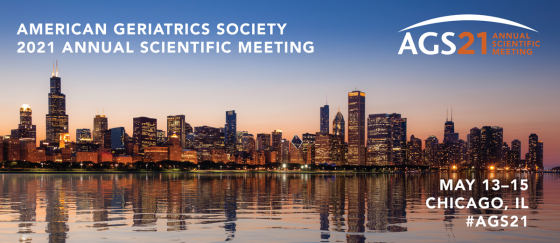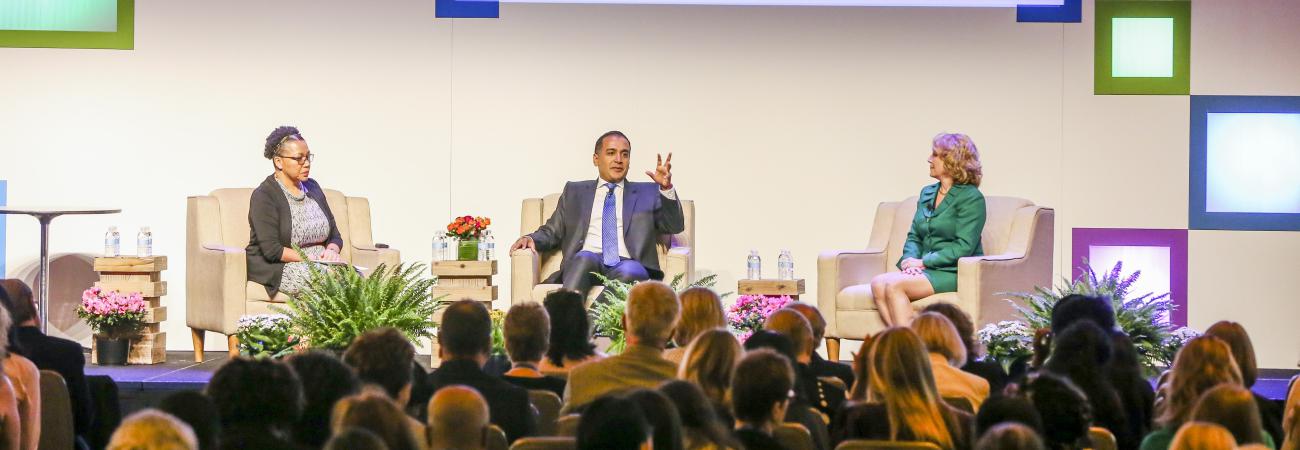SAGES 2021 ANNUAL MEETING SCIENTIFIC SESSION ABSTRACT SUBMISSION INFORMATION
SAGES 2021 Annual Meeting
Postponed to June 15-18, 2021
MGM Grand
Las Vegas, NV
SUBMISSION DEADLINE EXTENDED TO:
FRIDAY, NOVEMBER 13, 2020, 11:59 PM PDT
Abstract Submission Supporting Document:
Manual for Abstract Submission Site»
Video Preparation Instructions»
Abstract Guidelines»
You are invited to submit paper and video abstracts to the SAGES 2021 Scientific Session.
The program will consist of oral presentations, video presentations, and poster presentations. The program committee will be responsible for selecting the length of the oral and video presentations.
There is a 400 word limit for written abstract submissions and a 100 word limit for video abstract submissions. No reference to the authors or the institution should appear within the body of the abstract or in the abstract title.
SAGES will be accepting online submissions for oral, video or poster presentation. Topics include:
- Acute Care
- Bariatric
- Biliary
- Colorectal
- COVID-19
- Diversity and Inclusion
- Education/Simulation
- Flexible Endoscopy
- Foregut
- Hernia
- Leadership & Professional Development
- Liver
- Miscellaneous/Other
- New Technologies/Techniques
- Pancreas
- Quality Improvement/Health System Outcomes
- Robotics/Advanced Technologies
Important Notice: The following Abstract Submission Policies will be firmly enforced:
-
- Previously Presented Abstracts: No abstracts may be submitted that have been previously presented at a regional (Central Surgical, Southwest Surgical, etc.), national, or international meeting. Abstracts that have been presented locally (state ACS chapter meeting, institutional or departmental research day for example) will be considered. If the abstract has been previously presented locally, where and when it was presented must be disclosed during the abstract submission process
- No Previously Published Submissions: The abstract submitted must present original work that has not and will not be published prior to the SAGES 2021 Scientific Session.
- Exception To The Rule: If your abstract was accepted for SAGES 2020 but was NOT presented at SAGES 2020, you are permitted to submit the abstract for consideration for presentation at SAGES 2021. If the associated manuscript was submitted to Surgical Endoscopy, or the associated manuscript already has been published in Surgical Endoscopy, you may still submit your abstract for consideration for presentation at SAGES 2021 as long as it will not have been presented anywhere prior to SAGES 2021, but you may not submit the same manuscript for additional publication.
- No Dual Submissions: The abstract must not be submitted to any other upcoming regional, national, or international meeting.
- No Previously Presented Data: All abstracts must be new and original content OR include at least 50% new data if previously presented at a meeting (unless presented locally as described above).
- There is no limit to the number of abstracts you may submit, but you may not submit a video abstract and a written abstract on the same study/data set. You must select either a written abstract submission or a video abstract submission.
- Manuscript Submission: Accepted Oral Abstract Presenters must submit a complete manuscript to Surgical Endoscopy (unless your manuscript was submitted to Surgical Endoscopy as part of an unpresented SAGES 2020 presentation).
Written Abstract Submissions
-
- The word limit for written abstract submissions is 400-words (not including title and authors).
- Images are allowed with abstract submissions. Images must be no larger than 1MB in file size, and no larger than 900 pixels wide by 900 pixels high.
- Tables may be included in the abstract submission but will go against the abstract’s 400-word limit.
- Videos may not be submitted with a written abstract
Video Abstract Submissions
- The Maximum length for submitted videos is Seven (7) Minutes. SAGES is not accepting 3D Video submissions. If your video is accepted for presentation at the 2021 SAGES meeting, you will be required to bring a final copy of your video with you to the meeting.
- A short (100-word maximum) written description of your video should be included when submitting your video abstract.
- Images and tables should not be included in the short written description when submitting a video abstract.
- Videos must have narration in English. Without narration, it will not be considered.
- Videos may not include advertisement or promotion of products.
- DO NOT include any music and DO NOT include any video clips or other materials/media copyrighted by any entity other than yourself
SAGES Emerging Technology Abstract Submissions
Abstract submissions for SAGES’s Emerging Technology Session will be opening in February 2021. More information is available at:
https://www.sages.org/meetings/etabstracts/
Resident and Fellow Training Committee Contest and Awards
The Resident and Fellow Training Committee (RAFT) offers two awards for outstanding abstracts presented by Surgical Residents and Fellows at the SAGES 2021 Annual Meeting. The purpose of these awards is to encourage the development of clinical and research-oriented work in the field of general surgery.
To qualify for these awards, the abstract presenter must be enrolled in a qualified residency or fellowship program. During the abstract submission process you must fill out the anticipated Residency/Fellowship completion date and you must send proof of enrollment to the SAGES office via email (Indicate the name of the Resident/Fellow and the title(s) of the abstracts being submitted). Proof of enrollment must be emailed to abstracts@sages.org. by December 1, 2020. Abstracts that do not include the anticipated Residency/Fellowship completion date during the time of submission and do not submit proof of enrollment will not be considered for these awards.
SAGES Policy on Employees of Commercial Interests
The ACCME states that an employee/owner of a commercial interest may not serve as a planner or speaker for an accredited CME activity when the topic to be discussed is relevant to the products or services of the company. Therefore, the SAGES Conflict of Interest Committee (CIC) declares that no employees/owners of a commercial interest may present in SAGES CME accredited activities. This policy is applicable to invited faculty, abstract presenters, and poster authors (if posters are approved for CME). Individuals who serve on a commercial interest’s Board and who receive a salary will be considered an employee.
It is the general expectation of ACCME that commercial interest employees/owners may not be involved in the content of accredited education. However, if the products and business lines are in no way related to the content of your abstract, SAGES may consider an individual exception at its discretion. Please contact erin@sages.org. to request an exception.
If a faculty/presenter indicates they serve on an Advisory Board of a commercial interest but are not salaried, or if they have equity interest but are not salaried, then they will not be considered an employee but their presentation must be peer reviewed.
If a non-presenting author is an employee, then the presenting author may elect to remove that author or participate in a non-CME activity such as the Emerging Technology session.
If you have any questions, please contact the SAGES office at 310-437-0544 (ext. 118) or email: abstracts@sages.org.
Sincerely,
Adnan Alseidi, MD, EdM, Program Co-Chair
Dana Telem, MD, MPH, Program Co-Chair

Abstract Submission Opens Friday, October 16, 2020. For more info, see link: https://www.assh.org/s/
FUTURE ANNUAL MEETINGS
76th Annual Meeting of the ASSH
September 30-October 2, 2021 *San Francisco, CA
Residents & Fellows Conference and Precourses begin on Wednesday, September 29, 2021.
77th Annual Meeting of the ASSH
September 29-October 1, 2022 *Boston, MA
Residents & Fellows Conference and Precourses begin on Wednesday, September 28, 2022.
78th Annual Meeting of the ASSH
October 5-7, 2023 *Toronto, ON
Residents & Fellows Conference and Precourses begin on Wednesday, October 4, 2023.
79th Annual Meeting of the ASSH
September 19-21, 2024 *Minneapolis, MN
Residents & Fellows Conference and Precourses begin on Wednesday, September 18, 2024.
Abstract Submission Now Open
The American Surgical Association is now accepting abstracts for their 141st Annual Meeting. Please submit your abstracts today for consideration in the 2021 Annual Scientific Program.

Deadline: Monday, November 16, 2020 at 11:59 pm ET
 Download Author Instructions
Download Author Instructions


Deadline: Sunday, November 22, 2020 at 11:59 PM EST
 View Submission GuidelinesAbstract submission categories include:
View Submission GuidelinesAbstract submission categories include:
- Breast
- Microsurgery/Flap Physiology/Ischemia Reperfusion
- Skin/Burn/Wound Healing
- Plastic Surgery Education/Training/Leadership/Practice
- Patient Safety/Health Care Cost/Access to Care
- Hand
- Aesthetic
- Gender Confirmation Medicine/Surgery
- Transplant
- Innovation/Commercialization/Technology
- Benign and Malignant Tumors
- Vascular/Lymphatic Biology and Diseases
- Craniofacial
- Nerve

Submit An Abstract
2021 Annual Meeting Call For Abstract Submissions
Abstract Submission
Thank you for your interest in submitting an abstract of original research for presentation as a paper or poster at the AGS 2021 Annual Meeting. All abstracts must be submitted online – hard copy abstract submissions will not be accepted. The abstract submission deadline is December 2 at 11:59 pm Eastern Time.
The abstract submission fee is $40 per abstract payable by credit card. Visa, MasterCard and American Express are accepted. This charge will appear on your statement as “AGS”.
Submission of an abstract does not constitute registration for the AGS 2021 Annual Meeting. Authors of accepted abstracts are expected to register for the meeting and pay the meeting registration fee.
Notification of the Abstract Selection Committee’s decision will be made in February 2021. Abstracts accepted for presentation at the AGS 2021 Annual Meeting will be published in the Journal of the American Geriatrics Society exactly as they are submitted.
Encore Presentations
The AGS invites encore presentations of research that has already been presented at other national or international meetings. Encore presentations of research should not have been published in anything other than abstract form before the 2021 AGS annual meeting. Please note that if you are applying for the Health in Aging Foundation New Investigator Award, you cannot submit an encore presentation.
Abstract Content And Format
Scientific abstracts report the results of original research and must contain data (either quantitative or qualitative) and report research results.
ABSTRACT BODY: The abstract should conform to the following organization and contain:
| Background: | should describe the context and importance of the study and state the objective(s) of the study. |
| Methods: | should include a description of the methods used considering study design, setting, population, measures, and analytic procedures. |
| Results: | should describe the results in sufficient detail to support the conclusions. Tabular or graphic results are acceptable. Include any data on the racial/ethnic diversity of your research population in this section. It is not satisfactory to state, “The results will be discussed” or “Other data will be presented”. Abstracts that do not provide actual results will not be considered for publication or presentation. |
| Conclusions: | should state the implications of the findings for clinical practice, research, education, or policy. |
Scientific abstracts that do not describe research methods and present study results will not be considered for presentation at the annual meeting. Statements such as “data will be presented” or “results will be shown” should not be included in submitted abstracts. Abstracts should include only nonproprietary (generic) names, which should be written in lowercase letters, e.g. acetaminophen.
ABSTRACT LIMIT: There are no restrictions on the number of abstracts you may submit. If more than two abstracts are accepted from one investigator, one of the co-authors should make any additional presentation.
CHARACTER LIMIT: There is a limit of 2650 characters for the text of your abstract submission. This includes title, authors, institutions, references and abstract body, as well as all spaces.
TABLES and GRAPHICS: You may elect to submit either a table or an image, but not both. If you chose to submit a table, each row in the table will count as 50 characters. Image character count deduction is based on image size. The maximum deduction for an image is approximately 1200 characters. Images and tables can be easily edited or deleted any time before the submission deadline.
ABSTRACT PROOF: Proofing your abstract carefully is your responsibility. If accepted, the abstract will be published exactly as it is submitted – changes to the abstract will not be allowed once it has been submitted. Make sure all special characters and formatting are displaying properly in your proof. If you find errors, return to the appropriate page by clicking on the page name in the sidebar menu, and make your corrections.
ABSTRACT SUBMISSION CATEGORIES: Scientific abstract submissions must identify a primary submission category.
| Case Series & Case Studies Scholarship using individual cases or case series to provide insight into best practices in geriatrics. |
| Clinical Innovation & Quality Improvement Development and evaluation of innovative models of geriatric care; research testing and implementing quality measures, and using measures to improve care and outcomes. |
| Clinical Trials Research testing interventions using random or non-random control / comparison groups. |
| Epidemiology Descriptive studies of health and disease across large populations. |
| Ethics & Qualitative Research Research exploring ethical and humanistic aspects of healthcare. |
| Geriatric Bioscience Animal or human research examining fundamental biology of aging and / or disease processes. |
| Geriatric Education Research and evaluation of innovation in health education. |
| Geriatric Medicine in Other Specialties Research on care and outcomes in Emergency Medicine, Surgery, Rehabilitation, or other specialties working with geriatric populations. |
| Geriatric Syndromes Descriptive research on the mechanisms, natural history or management of major geriatric syndromes. |
| Health Services & Policy Research Research on healthcare delivery, policy and payment. |
| Neurologic & Behavioral Science Research on neurologic or psychiatric conditions affecting older patients. |
Attestations
Presentation of original research findings is an important component of the American Geriatrics Society’s Annual Scientific Meeting. Abstracts reporting results from original research studies will be reviewed by the Research Committee. Abstracts that are selected will be presented in poster and oral paper sessions devoted to original research.
By submitting an abstract for consideration, all authors must affirm the following:
- I understand that submission of an abstract constitutes a commitment to present if accepted and that failure to present, if not justified, will jeopardize future acceptance of abstracts.
- I understand that if accepted, the paper or poster abstract presentation must be made by one of the authors involved in the research and named as an author on the abstract.
- I understand that if more than two abstracts are accepted from an investigator, one of the co-authors must make any additional presentation.
- I affirm that this abstract does not duplicate other research I have submitted.
- I affirm that this research will not be published before the 2021 AGS Annual Meeting.
- I affirm that this abstract complies with the principles set forth in DHHS Code of Federal Regulations #45 CFR 46 on Protection of Human Subjects.
- I affirm that this abstract complies with the guidelines of the American Association for the Advancement for Science in requiring assurances of the responsible use of animals in research (American Association for the Advancement of Science. Resolutions on Use of Animals in Research, Testing, and Education. Adopted by the AAAS Board and Council, February 19, 1990).
- I affirm that this abstract complies with the guidelines of the International Committee of Medical Journal Editors regarding publication ethics (International Committee of Medical Journal Editors. Uniform Requirements for Manuscripts Submitted to Biomedical Journals. Ann Intern Med. 1997; 126:36-47). In particular, I affirm that “all persons designated as authors qualify for authorship, and all those who qualify are listed. Each author has participated sufficiently in the work to take public responsibility for appropriate portions of the content. Authorship credit is based only on 1) substantial contributions to conception and design, or acquisition of data, or analysis and interpretation of data; 2) drafting the article or revising it critically for important intellectual content; and 3) final approval of the version to be published. Conditions 1, 2, and 3 are met for all authors”.
- I affirm that I have disclosed all funding in support of this research at the time of my submission and understand that the AGS will publish a statement regarding support of my research in the abstract book.
- If accepted to present this research, I agree to disclose sources of funding at the time of presentation either in print (posters) or on a slide (oral paper presentations).
- I affirm that submitted abstracts include only generic names and that should it be accepted, the poster or paper presentation will also use only generic names when discussing drug therapies.
ENCORE PRESENTATIONS
The AGS invites encore presentations of research that has already been presented at other national or international meetings. Encore presentations of research should not have been published in anything other than abstract form before the 2021 AGS Annual Meeting. Please note that if you are applying for the New Investigator Award, you can not submit an encore presentation.
- I affirm that if this abstract is an encore presentation, the research will not have been published in anything other than abstract form in advance of the AGS 2021 Annual Meeting.
Violation of these Guidelines
I am aware that violation of these submission guidelines may result in:
- a retraction withdrawing the abstract and detailing the reasons for its withdrawal being published in JAGS.
- me and any industry supporter being prohibited from submitting an abstract for the next Annual Meeting, and a communications company organizing the submission being prohibited from participating in the next two annual meetings.
- potential imposition of a $5000 fine on any industry supporter for each abstract that violates any of the submission guidelines.
Copyright Transfer
All authors must agree to transfer to the American Geriatrics Society the copyright and all other rights in the material comprising the abstract if the abstract is accepted. Authors with exceptions that will not allow them to agree to the transfer of the copyright (e.g. U.S. Government employees) should note the reason for not agreeing to the transfer of the copyright.
http://www.southernsurg.org/meeting.html

Stanley Yung-Chuan Liu MD, DDS, FACS
Assistant Professor of Otolaryngology/Head & Neck Surgery
and by Courtesy, of Plastic and Reconstructive Surgery
Director, Sleep Surgery Fellowship
Stanford University School of Medicine
2021 Annual Research Meeting
Today’s research driving tomorrow’s outcomes.

New! We’re Starting on Saturday
Abstract submission will open soon. Please visit the website for updates: https://www.academyhealth.org/events/2021-06/2021-annual-research-meeting
Bringing the Health Services Research Community Together
Planning is underway for the 2021 AcademyHealth Annual Research Meeting – the premier forum for health services researchers, policy analysts, clinicians and community leaders using evidence and data to improve health and health care for all.
Amid the lingering uncertainties presented by the COVID-19 pandemic, the ARM will include virtual participation opportunities for the 2021 event. We’ll provide more information about in person and/or virtual participation options soon.
Chair

COMMITTEE MEMBER
Darshak Sanghavi, M.D.
Darshak Sanghavi, MD, was most recently the Chief Medical Officer of UnitedHealthcare’s Medicare & Retirement … Read Bio
Vice-Chair

COMMITTEE MEMBER
Julia Adler-Milstein, Ph.D.
Dr. Adler-Milstein is a leading researcher in health IT policy, with a specific focus on electronic health rec… Read Bio
Stay Connected
- Learn more about the Annual Research Meeting. Sign Up Here »
- Follow @AcademyHealth on Twitter and join the conversation using #ARM21
